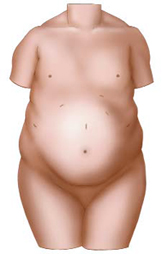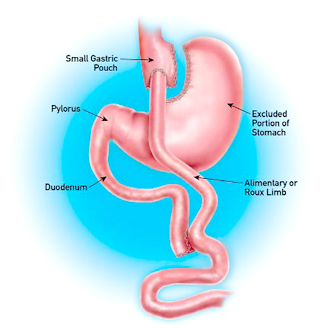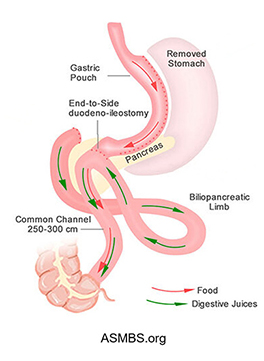Surgical Weight Loss
Is Metabolic Surgery Right for You?
Metabolic bariatric surgery may be the next step if, after trying non-surgical approaches, you remain severely obese or if you have an obesity-related disease. According to the National Institutes of Health, metabolic bariatric surgery should be considered only for a person diagnosed with morbid obesity; it is not for those with a mild weight problem. It is a serious undertaking, not a cosmetic procedure. Anyone thinking about undergoing this type of operation should understand that the surgery will cause a reduction in the number of calories you may consume, and you must commit to lifestyle and dietary changes to derive maximum benefit from the procedure.
The surgery is not a cure — it is only a tool. Success is possible only with your full cooperation and commitment to behavioral change and medical follow-up, which must be carried out for the rest of your life.
Your health insurance company may have additional criteria or exceptions for weight loss surgery. Be sure to check with your carrier about your plan and find out whether there are any additional requirements.
Deciding on Weight-Loss Surgery: Questions to Ask
The following questions may help you decide whether weight-loss surgery is right for you:
- Do you meet the weight and health guidelines established to determine eligibility?
- Are you determined to improve your health and lose weight?
- Have you been unsuccessful at long-term weight loss using non-surgical methods?
- Are you well informed about the surgical procedure and the effects of treatment?
- Do you fully realize how your life may change after the operation, such as requiring you to chew food well and eat smaller meals?
- Have you been informed of the potential for serious complications, dietary restrictions, and occasional failures?
- Are you committed to lifelong medical follow-up and vitamin/mineral supplementation?
Information About Metabolic Bariatric Surgery
It Starts Today – How Obesity Surgery Helps People Reclaim Their Lives
The American Society for Metabolic and Bariatric Surgery has created a film to show how surgery has helped those suffering with obesity. Watch on youtube.com.
PBS Civic Summit: Obesity, Weight Loss and Body Acceptance
Experts in the field of weight loss surgery, mental health, wellness and body acceptance will discuss the struggles, stigma and prejudices faced by members of the obese community and the many options available to them. Watch on pbs.org.
How Does Bariatric Surgery Work?
Metabolic bariatric surgery promotes weight loss by restricting food intake and, in some procedures, altering the digestive process. As with other treatments for obesity, the best results are achieved when combined with healthy eating behaviors and regular physical activity. If metabolic bariatric surgery is the right choice for you, your surgeon will discuss with you the procedures offered at the Center for Medical and Surgical Weight Loss and will explain which would achieve the best outcomes for your individual circumstance.
Generally, candidates for surgery must have either a body mass index (BMI) equal to or greater than 40 if they have no additional health conditions related to obesity, or a BMI of equal to or greater than 35 if they have additional health conditions related to obesity.
Other qualifications:
- Healthy enough to undergo a major operation
- Failed attempts at medical weight loss
- Absence of drug and alcohol problems
- No uncontrolled psychological conditions
- Consensus by multi-disciplinary team
- Understands surgery and risks

The preferred methods for metabolic bariatric surgery at the Center for Medical and Surgical Weight Loss involve laparoscopy (also known as minimally invasive surgery), a surgical technique in which a high-definition camera and very fine surgical instruments are placed through small incisions, instead of the standard large incisions. The image is then viewed on a video monitor by highly trained surgeons as they perform the procedure using the specialized instruments.
Eliminating the need for a large incision, laparoscopy results in less tissue damage, less blood loss, shorter hospitalization, a faster recovery, and fewer complications than open operations. The Miriam Hospital's state-of-the-art operating rooms and staff provide patients with the best care possible using laparoscopic techniques.

This relatively new surgery also restricts food intake after surgery and results in weight loss similar to banding surgery. In this operation, 70 percent of the stomach is removed. The new tube-shaped stomach limits food intake soon after surgery and results in improvement in a variety of medical conditions.
In some cases, a patient's morbid obesity is so pronounced that the patient would benefit from a two-stage process in order to lose several hundred pounds. Sleeve gastrectomy is usually performed as the first stage. A second surgery is offered to reach the goal weight for the patient when he or she reaches a safe weight, usually after a few months.

If a patient requires even greater weight loss than banding techniques produce, a gastric bypass operation is considered. Gastric bypass procedures reduce absorption of food, in addition to restricting food intake. Patients who have bypass operations generally lose 70 percent of their excess weight within one and a half years.
In Roux-en-Y gastric bypass, the most common metabolic bariatric procedure, a small stomach pouch is created by stapling to separate it from the rest of the stomach. Then, a section of the small intestine is attached to the new pouch to allow food to bypass the first portion of the small intestine to reduce calorie and nutrient absorption. The limited quantity of food, combined with reduced absorption of calories, results in faster and perhaps more pronounced weight loss than is normally achieved by the gastric banding procedure.
This procedure usually requires a two- to three-day hospital stay, and normal activities can be resumed in four to five weeks. Patients with type 2 diabetes often see immediate improvement in their diabetes after this surgery.

With a SADI-S procedure, about 80 percent of the patient’s stomach is removed leaving the rest of it shaped like a tube (similar to the sleeve gastrectomy). A portion of the first part of the small intestine is then divided and a connection is made to a loop of small intestine farther downstream. This is the only intestinal connection in this procedure.
After the procedure, food goes through the sleeve and directly into the latter portion of the small intestine. The food then mixes with digestive juices from the first part of the small intestine, helping the body absorb enough vitamins and minerals to stay healthy.
This type of surgery is highly effective for long-term weight loss and remission of type 2 diabetes. It is simpler and faster than other procedures and can be an additional option for a patient who already had a sleeve gastrectomy and is seeking further weight loss.
Biliopancreatic diversion with duodenal switch (BPD/DS), most often known as a duodenal switch, is a weight-loss surgery that reduces a patient’s ability to absorb calories, vitamins, and minerals. Duodenal switch patients can lose more weight than with other surgical methods like gastric bypass or sleeve gastrectomy. However, much like gastric bypass and sleeve gastrectomy, there are complications that are unique to this procedure.
Doctors generally recommend BPD/DS for people who are severely obese, with a body mass index (BMI) of 50 or great or a BMI of 40 or greater with serious type 2 diabetes and other serious health problems.
Other health problems include:
- Sleep apnea
- Heart disease
- Lung disease
- High blood pressure
- High cholesterol
- Nonalcoholic fatty liver disease
During a duodenal switch procedure, the surgeon removes the left portion of the stomach to limit food intake and then “switches” the small intestine to alter the digestion process and limit food absorption. This approach works in three ways:
- It limits stomach capacity.
- It reroutes food away from the upper part of the small intestine, which reduces how many calories and nutrients the body absorbs.
- It changes the way food mixes with bile and pancreatic enzymes – prompting additional weight loss.
This weight loss option shows greater results than gastric bypass or sleeve gastrectomy with 70% or greater excess weight loss at a five year follow-up, with favorable changes in gut hormones which regulate appetite. It is also effective against Type 2 diabetes. However, duodenal switch is the longest operation and may carry a higher risk of post-operative complications. Additionally, due to the reduced ability to absorb certain vitamins and minerals there is a risk of developing nutritional deficiencies after surgery.
It is important to discuss all options with your surgeon to identify the best choice for you based on your specific weight and health needs.
- Weight Loss Surgery at Saint Anne's Hospital
- Weight Loss Surgery at Morton Hospital
- Our Team of Experts
- What Is Obesity?
- Surgical Weight Loss
- Medical Weight Loss
- Surgical Clinical Outcomes
- The Journey
- Getting Started: Online Patient Orientation for Metabolic Bariatric Surgery
- Patient Support
- Success Stories
- Awards and Recognitions
- In the News
